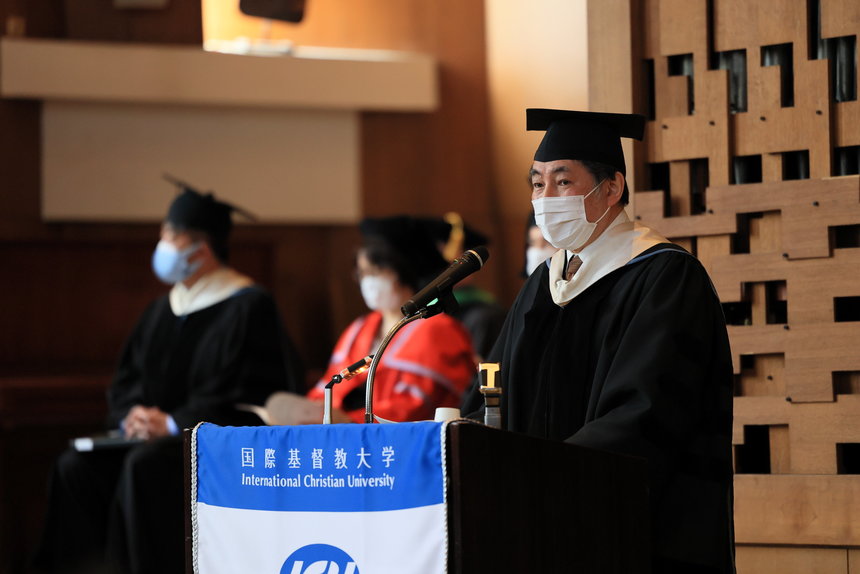NEWS
2022 Spring Commencement Ceremony
Update: March 25, 2022

519 undergraduate students and 39 graduate students graduated from ICU at its spring commencement ceremony held at the University Chapel on Friday, March 25.
To prevent corona infection, the ceremony was divided into two sessions, morning and afternoon and only graduates attended the ceremony.
In keeping with ICU's tradition of respecting the individual since its foundation, each graduate was introduced by name, hymns were sung, the scripture was read, and the President gave a commencement address.
While face-to-face interaction was limited due to the Corona pandemic, after the ceremony, students enjoyed reuniting with their friends at various places on campus under the cherry blossoms in full bloom.
Commencement Address by Shoichiro Iwakiri, President
Congratulations to all who have completed your Bachelor of Arts program in our Division of Arts and Sciences as well as to those who have finished the MA or PhD programs in our Graduate School of Arts and Sciences and who are graduating today. I also offer my sincere congratulations to all family members, relatives and friends of our graduates who attend the ceremony online.
For the past two years, the form and mode of teaching and research in the University have changed radically to prevent the spread of the new coronavirus. Everyone had to give up their old habits and adapt to the new societal environment. Each of us has had to go through many trials. I want to express my deep respect for the efforts and resilience of each of you who, despite the difficulties, continued your studies, worked on your theses and accomplished your goals.
What we have experienced is the sudden appearance of an anomaly that has transformed our usual everyday life into an unusual one. At the individual level, such things happen all the time; but when they happen at the collective level, it is the power of the community that is put to the test, and the qualities that the community possesses are revealed. Abnormal things include natural disasters, nuclear accidents, terrorism, viruses, wars.....They seem sudden to us, but in fact they may have already been there with their destructive powers, simply invisible to our eyes - only to suddenly and visibly encroach upon our daily lives.
We cannot know what will appear in the human world or in the natural environment until it happens. If possible, it would be desirable to use the power of science to transform what our consciousness is currently unable to grasp into a predictable and clearly recognizable object. However, one day something new and unexpected will exist in a place different from that which we had anticipated from the materials we have available. What is important then, I believe, is to be ready to face this new situation with something universal that is inherent in all of us. No matter how the social structure changes and how science and technology evolve in the future, what you have gained from your liberal arts education at ICU will stand you in good stead as you go through life. It is not grand gestures that are expected of you. You are expected to be curious, interested in people, to interact and love people as neighbors, approach individual problems with a "big picture" view, and to approach truth critically. Such a mindset and intellect will give you strong and dependable support when you need to make choices and decisions in the future.
What I trust you have found in the study of the liberal arts is a deeply enhanced experience of intellect and sensitivity that will make you clearly aware of what is important to human life, how truth is shared, and what should be the most central values of human activity. Such awareness will remain with you forever.
To use the metaphor from the Bible reading earlier, each of you has been sown in the soil of the liberal arts and has become a person who bears rich fruit. At the same time, the seeds of the liberal arts have been sown within you and, because of that, you will bear much fruit.
I'd like to ask how you visualized your life as a student before you enrolled at ICU. Do you find the lived reality at ICU equal to what you imagined?
In one of the novels I sometimes turn to, you can find the following passage: the protagonist reads books and listens to other people's stories before going to a seaside resort, where he lets his imagination run wild. When he actually gets there, he finds that what he had dreamed of is not there. The protagonist muses:
"Doubtless once in the Balbec which I had so long desired, I had not found the Persian church of which I dreamed, nor the eternal mists. The charming 〔...〕 train itself had not matched up to my imaginings. But in exchange for what the imagination leads us to expect and what we take so much trouble to try to discover, life gives us something that we were far from being able to imagine".
(Marcel Proust, The Fugitive, translated by Peter Collier, Penguin Books.)
But for his imagination and expectations, the protagonist would not have gone where he did. In this sense, the power of imagination is not being denied. But, as so many of the great works of world literature teach us, to live is to accept one's sense of fantasy being destroyed and then to discover new truths out of it.
I wonder what your life at ICU has brought to you. I hope that everything - the joyful, the sad, the confusing - will combine to represent irreplaceable experiences for each one of you.
Congratulations on your graduation. I wish each of you a life filled with blessings and hope that each of you will play your part as a peace-builder in this world.

